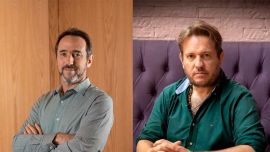President Alberto Fernández has come under fire after refusing to condemn the Cuban government's actions in response to recent demonstrations by citizens.
More than 100 people, including independent journalists and opposition activists, have been arrested in Cuba during unprecedented anti-government protests, with some remaining in detention Tuesday, various sources said.
Speaking Monday, Fernández responded to questioning about human rights violations by describing the US-imposed trade embargo with Cuba as “inhumane.” He rejected calls for any foreign intervention into politics on the island.
“I don't know what is happening in Cuba, but let's end the blockade. The people must decide the way in which they want to live, if we are to favour their peace. There is nothing more inhumane in a pandemic than a blockade,” the Peronist leader said in an interview with Radio 10.
The United States has maintained a strict trade embargo on the island since 1962, which, according to the Cuban authorities, is the main cause for the economic hardships facing citizens.
Fernández argued that "when they [the US government] block a country, what they do is block a society and what suffers is not a government, it is a society."
Cuba leader Miguel Díaz-Canel said Monday that Washington is behind the demonstrations that erupted over the weekend, in which thousands of Cubans took to the streets in dozens of cities. The rallies erupted spontaneously, as the country endures its worst economic crisis in 30 years, with chronic shortages of electricity, food and medicine and a recent worsening of the coronavirus epidemic.
Droves of demonstrators chanted "Down with the dictatorship" in protests dispersed by police. About 100 protesters again gathered in Havana Monday evening, shouting "Down with communism."
Cuba's San Isidro free speech protest movement later published a list on Twitter of 144 people held or reported as disappeared after Sunday's uprising, which saw thousands of Cubans take to the streets in dozens of cities and towns.
US urges restraint
The United States on Tuesday urged Cuba to end Internet restrictions imposed after unprecedented protests and renewed a call for the release of detained demonstrators.
"We call on Cuba's leaders to demonstrate restraint [and] respect for the voice of the people by opening all means of communication, both online and offline," State Department spokesman Ned Price told reporters.
"We commend the people of Cuba for showing great bravery," Price said, adding that Havana has responded by trying to "silence their voices."
"We call for calm and we condemn any violence against those protesting peacefully. And we equally call on the Cuban government to release anyone detained for peaceful protest," he said.
Pushed to comment on the rallies, Fernández considered that "these things have to be resolved by the people,"warning that "if people are economically burdened and a pandemic arrives, the burden gets heavier."
"I am not the one who has to tell people what to do,” he argued. “It is not Argentina’s place or any country in the world. We have to promote peace among people and find dialogue and ways out.”
Fernández said that was the same path he proposes as a way to rectify the crisis in Venezuela. In the case of that country, the president argued that he has "accompanied the reports from [UN High Commissioner for Human Rights, Michelle] Bachelet when they were very severe on human rights, but that does not mean [supporting] the intervention of third countries in a country, to figure out what a government should be like," insisted the president.
"In the same way, I was against what they did with [former Bolivian president] Evo Morales, the OAS [Organisation of American States] and those who endorsed [interim leader Jeanine] Añez's coup" in 2019, he added.
‘A pity’
Former foreign minister Andrés Cisneros described the president's comments as "a bit of a pity."
"The Argentine government criticises [Augusto] Pinochet but not Fidel Castro, who is another criminal," he told CNN Radio.
"It is incredible that President Fernández doesn't know what's happening in Cuba," said the ex-Carlos Menem administration official.
"Cuba has become the perfect storm. Every revolution produces dictatorial governments," he concluded.
Opposition leader Patricia Bullrich also criticised the president's remarks, expressing disbelief that he was not personally aware of the actions of Cuban security forces. "What is he looking at? The Disney Channel? Does the foreign minister not comment on problems in Latin America?" she quipped on LN+. "If he wants to defend Cuba, let him say so, make it clear," she said. "We are against the Cuban dictatorship and we ask that this regime of dishonest elections ends."
On Monday, tensions also spilled over locally, outside the Cuban embassy in Belgrano, with mobilisations by defenders of the regime in Havana and Cuban exiles who live in Argentina.
– TIMES/AFP























Comments